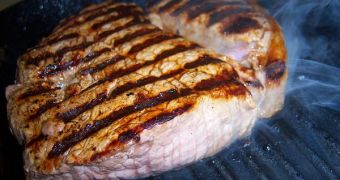Scientists say that technology will soon advance to the point where it will be possible to grow meat inside labs, without the need for the actual living things that wear it for some time before being killed for it. Even now, it is possible to grow tiny nuggets of meat inside special laboratories around the world, but the existing capabilities do not even come close to the vast amounts needed to satisfy the needs of the general population. Growing meat without the animals is something that former British prime minister Winston Churchill predicted since the days of World War II, LiveScience reports.
One of the main advantages of growing artificial meat is the fact that the issue of contamination will be completely eliminated, scientists believe. Currently, scandals related to the improper treatment of animals, and the inadequate handling of the resulting meat, make headlines on a daily basis, so the new technology could see that stamped out in a relatively short amount of time. Additionally, any modifications to the meat could also be tested thoroughly first, without the need for manufacturers to cut corners in the validation process, as it's usually the case.
Over recent years, bioengineers have transformed science fiction into reality, with growing blood vessels, heart tissues and artificial skin cells inside the controlled conditions of a lab. But there is currently nothing stopping the scientists from beginning to produce meat for human use, rather than for medical purposes. But the capabilities also raise some disturbing possibilities. One such worry is that some researchers may see no problem in growing peculiar types of meat that could make the general public uneasy with this line of research.
For example, some groups may decide to adopt science-fiction avenues, in which they would create human flesh for consumption. “In principle, we could harvest the meat progenitor cells from fresh human cadavers and grow meat from them. Once taken out of its disease and animalistic, cannibalistic context – you are not killing fellow citizens for it, they are already dead – there is no reason why not,” biomedical engineer Mark Post, from the Maastricht University, in the Netherlands, says.
“If every package of naturally grown meat by law should have the text, 'Beware, animals have been killed for this product,' I can imagine a gradual cultural shift. Of course, we still have a long way to go to make a product that is even remotely competitive with current products,” the expert adds about the general effort.

 14 DAY TRIAL //
14 DAY TRIAL //